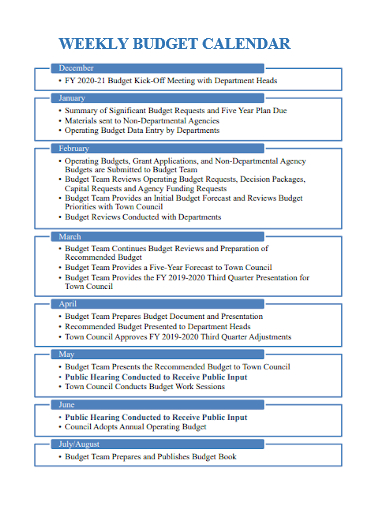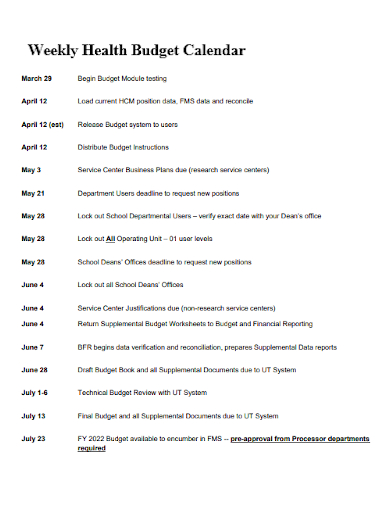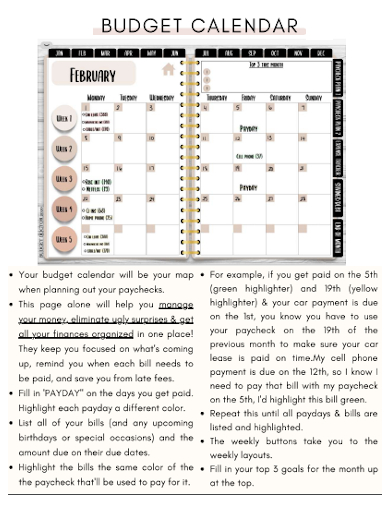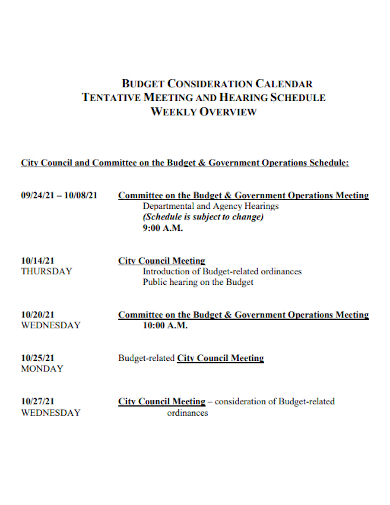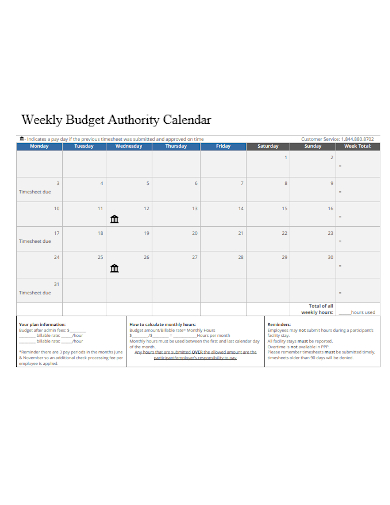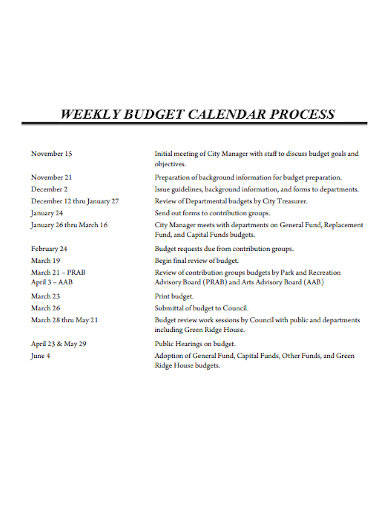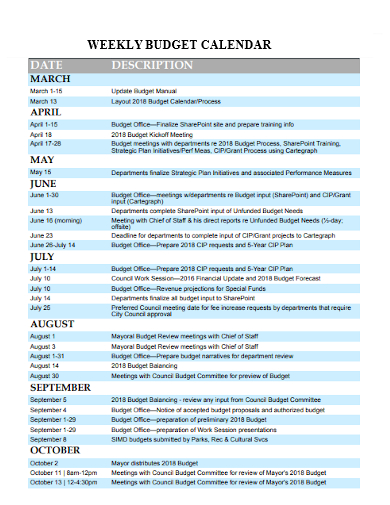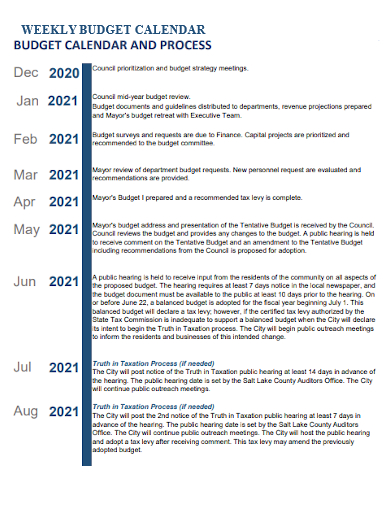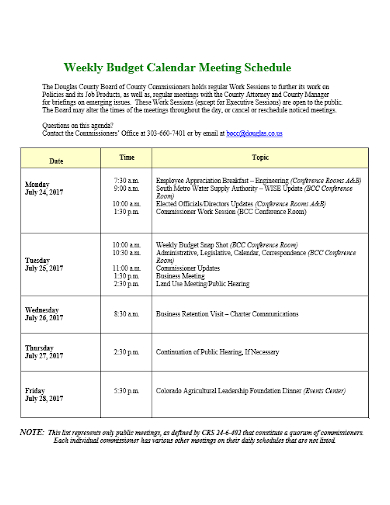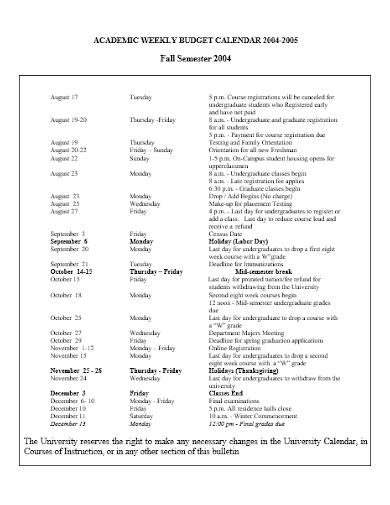While creating a budget isn’t the most exciting project in the world, it is a great way to gain control over your finances. You can make better financial decisions if you know how much money is coming in and going out. A good place to start is by calculating your total weekly income and expenses. Look for ways to save money, such as reducing the amount of time you spend eating out. Creating a set of budgeting objectives. The most important decision to make in order to begin saving is to create a budget. A budget is a comparison of income and expenditure over a set period of time. Keeping a close eye on expenses and income can help you save money in the long run, and the best way to keep track of your budget is to keep a weekly budget report.
10+ Weekly Budget Calendar Samples
A budget calendar is a calendar that records the amounts and dates of payments. It’s a useful tool for estimating how much money will flow in and out over the course of a month. You can use an existing traditional or digital calendar, or look online for free apps and templates.
1. Weekly Budget Calendar Template
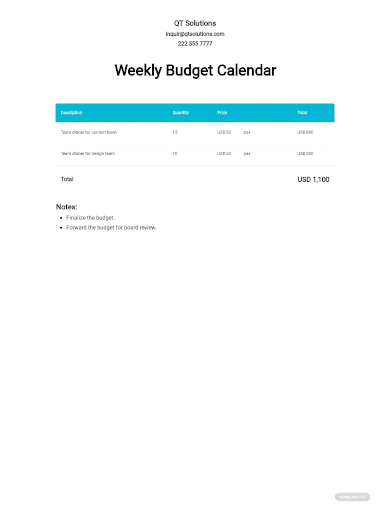
2. Weekly Operating Budget Calendar
3. Weekly Health Budget Calendar
4. Sample Weekly Budget Calendar
5. Weekly Budget Consideration Calendar
6. Weekly Budget Authority Calendar
7. Weekly Budget Calendar Process
8. Weekly Budget Development Calendar
9. Printable Weekly Budget Calendar
10. Weekly Budget Calendar Meeting Schedule
11. Weekly Academic Calendar Budget
How to Make a Weekly Budget
- Make a list of how you see your financial future. This is less about setting specific objectives and more about being realistic about the type of lifestyle you want to pursue in the future. Do you intend to make significant investments, such as purchasing a home, or would you prefer to put your money toward travel? Do you want to save your money or create a safety fund that you can then spend as you please? Do you have to help others with your money? Cutting out images of what they consider to be a financially successful lifestyle, such as a photo of a vacation home, can help some people stay motivated and focused.
- Make a list of all of your assets. Add up all of your cash in checking and savings accounts, as well as any interest or capital in retirement funds or investments, and the adjusted value of any major assets, such as a car or home. Knowing this number may not seem significant, but it allows you to set realistic goals that apply to your entire financial situation.
- Make a list of short-term objectives. These are goals that can be accomplished in less than a year. Make a list of all possible options and prioritize and rank them according to cost and priority. Then, based on the funds available in your budget, decide which ones you can begin working on.
- Set long-term financial objectives. Look for projects that will take more than a year to complete, preferably 5-10 years. This could include things like buying a house or increasing your retirement savings. Calculate when you want to achieve each goal and assign a monetary value to it. Then multiply the monetary value by the number of weeks required. This is the amount you’ll need to set aside for your long-term objective.
- Include your objectives as expenses in your budget. Choose which financial goals you want to focus on first. It’s usually best to begin small. Check your budget to see if the amounts you’ll need to save each week for your goals are still doable and realistic.
FAQs
Why is it important to use a budget calendar?
Each month, write down your income, upcoming purchases, debts, and goals to help you manage your money and avoid surprises. A budget calendar helps you plan out how much you’ll spend and when you’ll spend it. It serves as a reminder to make timely payments, which can help you avoid fees and a drop in your credit score.
What is good about having personal weekly budgets?
Personal weekly budgets are the best because they are flexible in so many ways. All you’ll need is a table with various columns for storing items that you buy frequently. If you carry a notebook with you all the time, you can draw this on it.
A weekly review of income and expenses assists us in separating our needs from our wants, as well as keeping our finances on track. Weekly budget planning and monitoring assist us in identifying and eliminating unnecessary expenses, as well as achieving our financial goals. Also, reviewing our expenses and income on a weekly or biweekly basis prevents us from feeling stressed at the end of the month due to overspending. So, by downloading a weekly budget template, let us set our saving priorities today.
Related Posts
FREE 10+ Annual IT Budget Samples in MS Word | MS Excel | Google Docs | Google Sheets | PDF
FREE 10+ Personal Budget Planner Samples in MS Word | MS Excel | Google Docs | Google Sheets | Apple Numbers | Apple Pages | PDF
FREE 5+ Yearly Budget Planner Samples in PDF | XLS
FREE 10+ Expense Budget Samples in MS Word | Google Docs | Google Sheets | MS Excel | PDF
FREE 4+ Vacation Budget Planner Samples in PDF
FREE 10+ Budget Outline Samples in PDF | MS Word
FREE 10+ Conference Budget Samples in MS Word | MS Excel | Google Docs | Google Sheets | Apple Pages | PDF
FREE 10+ Monthly Budget Worksheet Samples in PDF | MS Word | Google Docs | Google Sheets | Excel
FREE 10+ Monthly Project Budget Samples in MS Word | MS Excel | Google Docs | Google Sheets | PDF
FREE 10+ Corporate Budget Samples in MS Word | MS Excel | Google Docs | Google Sheets | PDF
FREE 9+ Primary School Budget Samples in MS Word | Google Docs | Google Sheets | MS Excel | PDF
FREE 10+ Operational Budget Samples in PDF | DOC
FREE 5+ Budget Layout Samples in PDF
FREE 6+ Paycheck Budget Samples in PDF | MS Word
FREE 10+ Architecture Budget Samples in PDF

